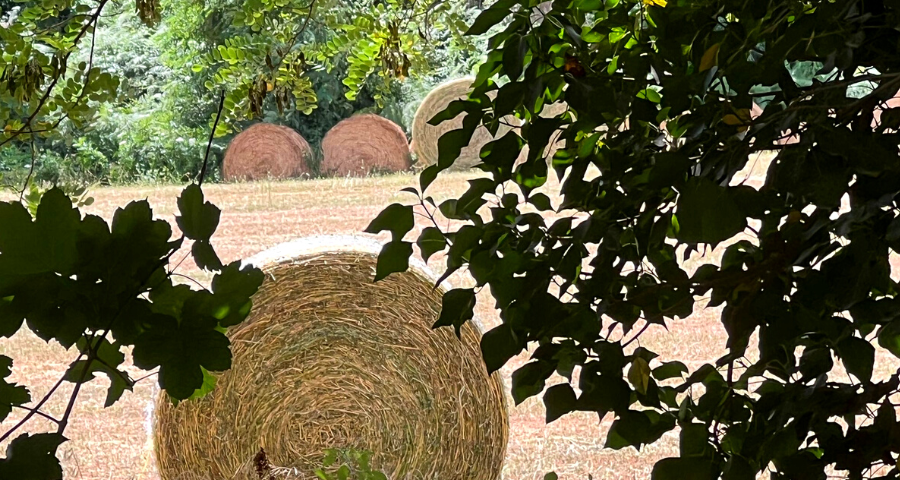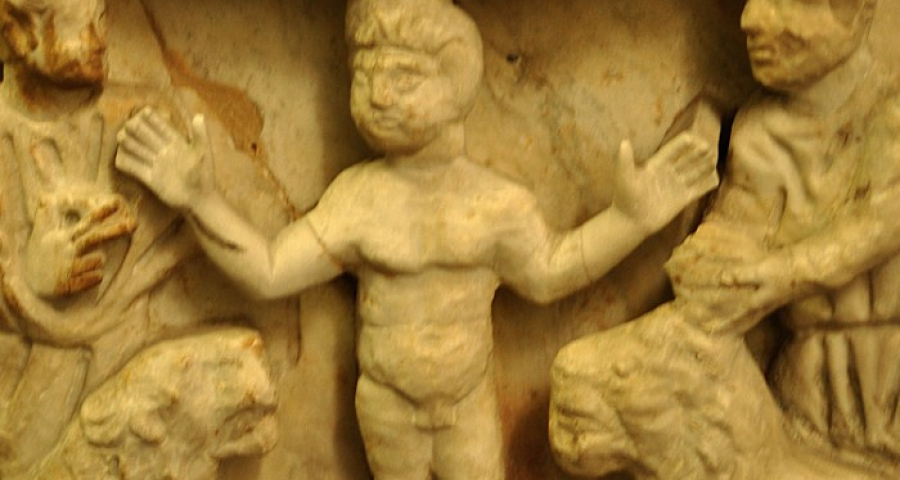The mystery revealed/13 - The Kingdom in the prophesy is a matter of men and women, not of angels and demons.
By Luigino Bruni
Published in Avvenire le 26/06/2022
"The great novelty in the Bible in humble matters regarding the economy lies in the overcoming of the economy, in the message that outlines a human mission that points to a higher lifestyle."
Riccardo Bachi, The political economy of the Bible, 1936 (L’economia politica della Bibbia)
The arrival of someone similar to yourself in a dream marks a turning point in the great vision of Daniel and his book: it is the beginning of a new story, no longer bestial but finally human.
After seeing the four beasts, and then the Eternal one, the Ancient of days, Daniel finally saw a man, one who resembled "a son of man". Letting us know that after the times of kingdoms and of monsters, his land, the land of all, will finally know a human kingdom. We will not be able to understand the arrival of this son of man if we do not compare him with the beasts of the first part of Daniel's vision. His historical prophecy is the true hope that one day, an indefinite but real and historical day, the bestial kingdoms of the ten-horned, big iron-toothed monsters will end and the kingdom of humanity will begin, of people who are no longer beasts, and of human sovereigns who will do what is good for both men and women. Finally, finally for Daniel, and finally for us, who for millennia have watched the World and its wars and its four-headed monsters. Thus, while repeating Daniel's same question we begin to pray his own prayer: “Ancient of days, Eternal God: no more injustice, no more wars, enough with the monstrosity, help us to live as humans".
We should also be aware of the fact hat the Earth will never be exactly as we would like it to be, because it is us, it is you and me, who are not as we would like to be and should be. However, when reciting that prophecy-prayer we must try to make ourselves ignorant, and pray as if we were still with Adam in the first garden and right there with Daniel, with the prophets and with the children, and ask, ask and ask once more. And then, not stop until that small piece of land where we live looks a little more like the World of tomorrow and of the son of man. The son of man is our son as well, he is all the sons and daughters who ask us to grow up in a world that is finally human (Daniel 7,13-14). These verses from chapter 7 in the Book of Daniel are perhaps the best-known in the whole book. There are legions of interpretations, Jewish and Christian, canonical and apocryphal and the flow of newly minted hypotheses has never stopped. Anyone who has just leafed through the Gospels has at least once encountered the expression "Son of man", which Jesus often used to refer to himself. And if the messianism of Jesus is that of the Son of man, then it is also, and above all, a human matter. Because his Kingdom of Heaven is not about heaven or the next life, it is about this earth. The Kingdom inaugurated by the Son of man is a matter of men and women, not of angels and demons. It is history, historical prophecy, earth and dust. It concerns justice, orphans and widows, Lazarus and the rich man, good Samaritans and good innkeepers, victims and executioners, taxes and virtues, wine and crosses. It therefore concerns the economy, politics, law, weapons, peace and war: «The kingdom of God is in your midst» (Luke 17,21).
Daniel's son of man is also a thing of the earth. Perhaps it is an image of the Messiah, of Isaiah's Immanuel, of Elijah's return, perhaps of Dante's "Veltro" (Inferno 1,101). It is always a child of man, however, therefore of life under the sun. The expression was not new. The prophet Ezekiel was very fond of it ("ben adam"). We do not know if chapter 7 in the Book of Daniel came before or after the apocalyptic traditions that gave life to the "Books of Enoch", where the son of man is a central figure in volume II, in the Book of Parables. However, Enoch's son of man does not help us to understand Daniel's Son of man. Daniel's chapter was written in Aramaic: "ben adam" is the Hebrew translation of the original Aramaic expression "bar nashà", which above all highlights the fragility of man together with his greatness (Psalm 8). In Daniel, in fact, the son of man is an earthly being climbing towards the divine court, "…and there before me was one like a son of man, coming with the clouds of heaven" (Daniel 7,13) while in Enoch it is a divine or angelic being. In Daniel the nashà bar is a thing of the world, in Enoch it is a thing of heaven. Perhaps the truest meaning of a son of man is a human being, a member of the human race: ecce homo.
The Book of Enoch did not enter canon because, as the ancient scribes of the third century BC said, those books did not get "their hands dirty", they did not get their hands dirty because they were too heavenly. The Book of Daniel on the other hand is canon because it does, and it does because its visions speak of the earth, of dust. Adam is above all terrestrial, the one molded with the dust from the ground. Hence, from history, because only a faith that is able to bring us into our history "gets its hands dirty" - and this good kind of dirt makes us more human. The rest of the story is no less important and beautiful. Having finished his visions of the beasts and the Son of man, Daniel finds himself in a situation similar to that in which King Nebuchadnezzar found himself at the end of his dreams and nightmares (Daniel, chapter 2). Indeed: «I, Daniel, was troubled in spirit, and the visions that passed through my mind disturbed me. I approached one of those standing there and asked him the meaning of all this» (Daniel 7,15-16). Daniel, in fact, was the interpreter-prophet who, with his explanation of the king's mysterious dream, was able to calm him down. Now, that he himself receives a dream-vision, however, Daniel is the one in need of an angel-interpreter to soothe his own worry. The interpreter needs another interpreter, the prophet needs another prophet. A passage that suggests many decisive things in the life of a prophet.
Certainly, the literary genre of dream had its own rules and canon, which we no longer understand today; however, there is one thing we can say. Prophecy is an aspect present among many people, inside and outside the realms of religion, any form of vocation is prophecy. Thus, when a prophet must decipher his own dreams because one day he starts dreaming on his own and wishes to understand his own dreams, the first that he experiences is insufficiency, the gifts and charisms that had assisted him in interpreting the dreams-nightmares of others for so long, do not work when applied to himself. Hence, the prophet feels bereft of something, poor, and in great need of an interpreter to understand the meaning of his own visions. The prophecy here reveals an intimately relational nature of its own. The prophet has the gift of reading the visions of others; his talent is revealed within the realms of a relationship, a dialogue that then becomes the revelation of mysteries. This relational dimension is so essential in biblical humanism and anthropology that when a prophet finds himself dreaming, to understand the meaning and message of those dreams he needs an "angel" to explain them to him. Like all gifts and talents, even the prophetic ones can only be activated within some form of relationship; opening up while receiving something in return. "The spring is not for me" (St. Bernadette), it is also the golden rule of prophecy. And it reveals something essential to us.
There is a great temptation that sooner or later comes into the life of those who, by vocation, have received gifts that they have freely used for the benefit of the community and of everyone. This temptation usually creeps in after the great successes those talents-gifts have generated. One day, one begins to think of using the gift no longer for the benefit of others but for the benefit of oneself. Faced with the great results of one's own talents applied to the free service of others, a thought that slowly becomes dominant arises: "Why should I not use these skills-talents for myself as well? Why not use them to generate an income, perhaps for a good purpose? I too have the right to understand my own dreams..." If you give in to this temptation, whatever chastity was there towards your gifts will end, and chastity from yourself, the one crucial kind of chastity to keep up in the course of life, until the very end.
Faced with these natural and perhaps necessary temptations, Daniel tells us something decisive: "You too have the right to decipher your dreams, but you must find yourself an angel, you cannot use your own charisma for yourself". Because the greatest and most precious gifts-charisms are given to us for the good of all, they are common goods, and when we try to privatize them, they self-destruct. And then when we wish to use them again to interpret the dreams of others, the gift will no longer work - this is how many honest born prophets turn into false prophets, for a lack of chastity from themselves. When an interpreter of the dreams of others one day dreams of his own big and different dream, the first sign that he is not becoming a false prophet is the presence of this indigence, the awareness of needing an angel-interpreter. This poverty is its great wealth. Another message concerns charismatic communities: when a community that has received a charism, has to interpret its own dreams, it must have access to a different charism, it cannot use its own for its own benefit - this is also the value of communion between charisms.
Finally, there is a rather curious element in the text: it seems that Daniel's worry and subsequent dialogue with the interpreter all took place while dreaming, because the angel-interpreter that Daniel finds is one "those who are around" the throne. The dream exegete is inside the dream itself. For many visions and dreams, it is possible, and perhaps a good thing, that the exegete is found outside of our dreams. The angel-interpreter must not be from our community, our religion or faith. Sometimes this otherness is a necessary therapeutic distance for a good exegesis. However, in certain different kinds of dreams, the interpreter must find himself within our own dream. The angel must be someone who knows us intimately because he finds himself inside the same experience, and is dreaming along with us. He "reads into it" with another kind of intelligence, because he/she is also a character of the vision in common, he is "one of those who are around" the throne. Sometimes we are not able to understand the messages of life because the interpreter is too close; other times, and these are the crucial ones, the revelation of the vision is found within our own quarters, but we seek it too far. And the turmoil in our heart does not pass.








